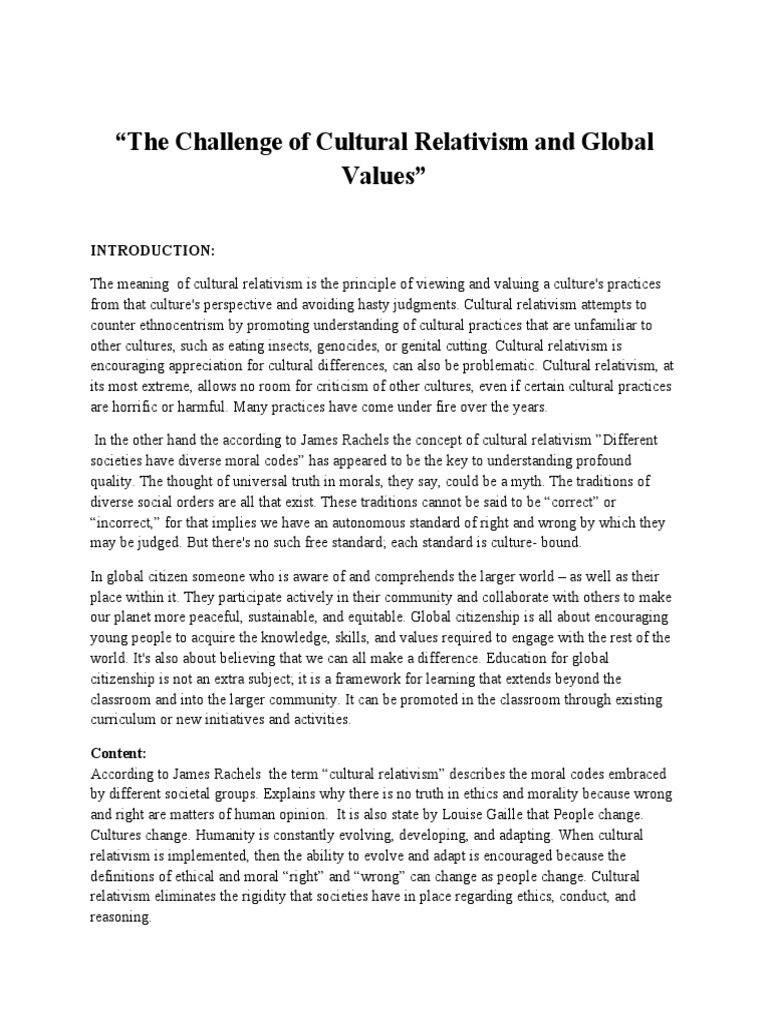In an increasingly interconnected world, the juxtaposition of cultural relativism and the pursuit of world peace presents a compelling conundrum. Cultural relativism posits that individual beliefs and practices are contextually bound within their cultural frameworks, leading to the assertion that there are no universal moral standards applicable across the different cultures. This perspective raises pivotal questions about the essence of global peace, which often hinges upon shared values and mutual understanding. As we navigate the complex waters of international relations, it becomes imperative to explore how these seemingly disparate concepts can harmoniously coexist.
The first step in reconciling cultural relativism with the ideals of world peace involves cultivating a profound understanding of the diversity that exists across global cultures. Each culture is a unique tapestry woven from its history, environment, traditions, and belief systems. This diversity can, at times, challenge the concept of universal ethics. However, acknowledging the validity of varying cultural practices allows for the potential of dialogue. When individuals and nations recognize the nuances of each other’s cultural landscapes, a fertile ground for empathy and respect emerges. Through education and exposure to different cultural paradigms, humanity can foster an atmosphere of goodwill and a shared commitment to understanding.
Moreover, the integration of cultural relativism into discussions of world peace encourages the notion of inclusivity in policy-making processes. Local and international governance structures often impose rules and norms that reflect a singular cultural lens, which can inadvertently marginalize minority groups. By incorporating culturally relative perspectives into peace-building dialogues, policies that honor local traditions and practices can be developed. This approach not only legitimizes the voices of diverse communities but also promotes a sense of ownership over the peace process. Such ownership is quintessential for sustained peace, as societies that feel represented are more likely to embrace and uphold the agreements reached.
At the same time, the principles of cultural relativism do not absolve individuals or nations of accountability. While it is essential to respect cultural practices, certain actions—such as human rights violations or environmental degradation—often transcend cultural boundaries. Herein lies a critical juncture: the challenge is to distinguish between cultural practices that are innocuous and those that perpetuate harm. This discernment necessitates the cultivation of universal ethical standards that can guide societies in safeguarding human rights while still respecting cultural uniqueness. Engaging in constructive dialogue about these standards is pivotal. It fosters a collective conscience that can support peace while allowing for local autonomy.
Furthermore, the role of grassroots movements cannot be overstated in reconciling cultural relativism with peace initiatives. These movements often arise organically from within communities, addressing local grievances through locally relevant solutions. Such initiatives not only empower individuals but also engage them in the pursuit of peace that reflects their collective identity. Through collaboration across cultural lines, these movements can transcend cultural biases, allowing for a deeper understanding of common human experiences, such as suffering, hope, and resilience. The success of these grassroots efforts often serves as a testament to the power of cultural diversity in building a peaceful world.
Embracing technology and digital platforms also holds significant promise for fostering cross-cultural communication and education. In a globalized era, the ability to share narratives, experiences, and cultural practices through social media and digital storytelling can pique curiosity and spark conversations that challenge preconceived notions. Consequently, these platforms can serve as spaces for shared learning and understanding, facilitating the blending of cultural relativism with global peace efforts. When individuals from diverse backgrounds come together online, they can collaboratively explore solutions to pressing international issues while respecting their differing cultural lenses.
The intersection of cultural relativism and world peace also prompts a reevaluation of existing power dynamics. Often, a hegemonic culture predominates global discourse, marginalizing those that do not conform to its normative values. Recognizing this imbalance is essential in the journey towards reconciliation. Empowering traditionally marginalized cultures not only enriches the global narrative but also contributes to a more equitable world. By amplifying diverse voices and perspectives, societies can co-create a peace framework that is both inclusive and effective.
As nations deliberate on how to coexist harmoniously, the need for mutual respect and understanding becomes increasingly apparent. The principles of cultural relativism can provide a pathway to acknowledge and celebrate diversity while working collectively towards world peace. Each culture possesses wisdom that, when shared, can enhance global strategies for peace. This perspective shift encourages curiosity about the richness embedded within different cultures, fostering a humanistic approach to global governance.
In conclusion, the reconciliation of cultural relativism and world peace holds the potential for transformative change. By facilitating inclusive dialogue, embracing grassroots movements, leveraging technology, and addressing power imbalances, it is possible to build a sustainable peace grounded in respect and understanding. Promoting curiosity and appreciation for the tapestry of global cultures can dismantle barriers, ultimately paving the way for a more peaceful coexistence. In facing the challenges of the current era, cultivating this mindset may not just be preferable—it is imperative for the enduring harmony of our world.
